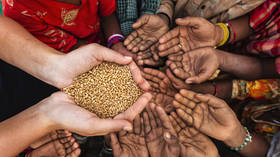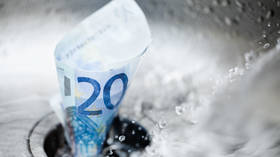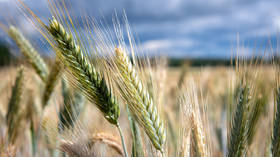Ukraine conflict could spark food riots in poor countries – WTO

The conflict in Ukraine and sanctions against Russia from Western countries are driving up global food prices, as Black Sea ports used to export grain remain blocked. The situation could lead to hunger and food rioting in poor countries, where food security depends on imports, the head of the World Trade Organization (WTO) Ngozi Okonjo-Iweala told the Guardian on Thursday.
“I think we should be very worried. The impact on food prices and hunger this year and next could be substantial. Food and energy are the two biggest items in the consumption baskets of poor people all over the world,” Okonjo-Iweala said, adding that “it is poor countries and poor people within poor countries that will suffer the most.”
Okonjo-Iweala specified that Russia and Ukraine provide 24% of global supplies of wheat, noting that food imports from the Black Sea region were crucial for survival for 35 African countries.
The WTO official urged food-producing countries not to make the same mistakes that were made with vaccines during the Covid-19 pandemic, when rich nations hoarded supplies, leaving poorer countries waiting to get doses.
“It is a natural reaction to keep what you have – we saw that with vaccines. But we shouldn’t make the same mistake with food… We must make sure we learn the lessons from vaccines and previous food crises. I am not sure we can fully mitigate the impact of the war in Ukraine because the numbers involved are huge, but we can mitigate some of it,” she noted.
Okonjo-Iweala expressed concern that Ukraine would not be able to kick off this year’s planting season on time due to the conflict. This is problematic, she noted, as Ukraine normally supplies half the wheat to the World Food Programme, the UN department that provides emergency supplies to countries.
“If we don’t think about how to mitigate the impact of the war that will be another catastrophe not just this year but next year,” she stressed, noting that food riots comparable to those in the late 2000s could start if prices grow further. In order to avoid escalation, she said the WTO is urging its 164 members not to impose export restrictions on food.
In a push to isolate Russia over its military operation in Ukraine, a number of WTO members, including the US, the UK, EU and Canada have imposed tariffs on Russia, slashing its most-favored trade partner status and calling on the trade body to kick Russia out altogether. However, according to Okonjo-Iweala, this is unlikely to happen, because the process would be too complicated and require 75% of members to approve.
For more stories on economy & finance visit RT's business section














